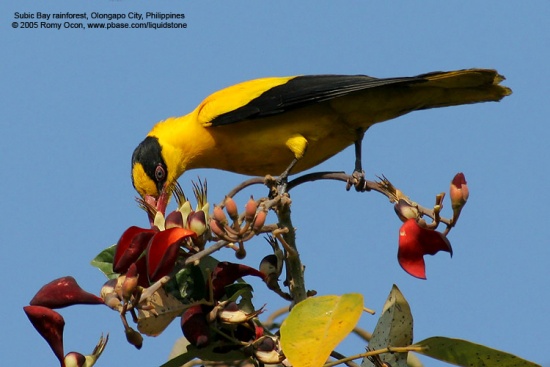(correcting distribution and taxonomy) |
(Flight photo added) |
||
| Line 1: | Line 1: | ||
| − | [[Image:Black-naped_Oriole.jpg|thumb|550px|right|Photo by Romy Ocon<br/>Location: The Philippines | + | [[Image:Black-naped_Oriole.jpg|thumb|550px|right|Photo by {{user|Romy+Ocon|Romy Ocon}}<br />Location: The [[Philippines]]]] |
;[[:category:Oriolus|Oriolus]] chinensis | ;[[:category:Oriolus|Oriolus]] chinensis | ||
| − | |||
==Identification== | ==Identification== | ||
| − | 27cm. '''Male''' - bright golden-yellow plumage, black mask through eyes meeting at nape, black and yellow wings and tail, pink bill, grey feet, red iris. | + | 27cm. '''Male''' - bright golden-yellow plumage, black mask through eyes meeting at nape, black and yellow wings and tail, pink bill, grey feet, red iris.<br /> |
| − | + | '''Female''' - as in male but duller, greenish yellow mantle.<br /> | |
| − | '''Female''' - as in male but duller, greenish yellow mantle. | ||
| − | |||
'''Juvenile''' - whitish underparts, blackish streaks on breast, grey bill, lacks nape band. | '''Juvenile''' - whitish underparts, blackish streaks on breast, grey bill, lacks nape band. | ||
| − | |||
==Distribution== | ==Distribution== | ||
From [[India]] east over [[Indochina]] to the [[Philippines]], [[Singapore]], [[Indonesia]] and eastern [[China]]. | From [[India]] east over [[Indochina]] to the [[Philippines]], [[Singapore]], [[Indonesia]] and eastern [[China]]. | ||
==Taxonomy== | ==Taxonomy== | ||
| + | [[Image:BNO DSC00186e web.jpg|thumb|350px|right|Photo by {{user|kelvinyam|kelvinyam}}<br />[[Putrajaya Wetland]], [[Malaysia]]]] | ||
Up to 20 subspecies are accepted.<br /> | Up to 20 subspecies are accepted.<br /> | ||
The [[Slender-billed Oriole]] was considered to be conspecific but is now widely accepted as full species. | The [[Slender-billed Oriole]] was considered to be conspecific but is now widely accepted as full species. | ||
==Habitat== | ==Habitat== | ||
Coastal woodlands and mangroves, cultivated areas, parks and gardens, to 1600m. | Coastal woodlands and mangroves, cultivated areas, parks and gardens, to 1600m. | ||
| − | |||
==Behaviour== | ==Behaviour== | ||
| + | ====Diet==== | ||
The diet includes fruit and berries, particularly figs, large insects, small animals, including nestlings. | The diet includes fruit and berries, particularly figs, large insects, small animals, including nestlings. | ||
| − | + | ====Breeding==== | |
| − | A cup-shaped nest is made from bark, small twigs, grass and roots. | + | A cup-shaped nest is made from bark, small twigs, grass and roots. Two to three bluish-white eggs with brown spots are laid and are incubated for about 14 days. |
==External Links== | ==External Links== | ||
{{GSearch|Oriolus+chinensis}} | {{GSearch|Oriolus+chinensis}} | ||
[[Category:Birds]][[Category:Oriolus]] | [[Category:Birds]][[Category:Oriolus]] | ||
Revision as of 12:29, 23 March 2009
- Oriolus chinensis
Identification
27cm. Male - bright golden-yellow plumage, black mask through eyes meeting at nape, black and yellow wings and tail, pink bill, grey feet, red iris.
Female - as in male but duller, greenish yellow mantle.
Juvenile - whitish underparts, blackish streaks on breast, grey bill, lacks nape band.
Distribution
From India east over Indochina to the Philippines, Singapore, Indonesia and eastern China.
Taxonomy
Up to 20 subspecies are accepted.
The Slender-billed Oriole was considered to be conspecific but is now widely accepted as full species.
Habitat
Coastal woodlands and mangroves, cultivated areas, parks and gardens, to 1600m.
Behaviour
Diet
The diet includes fruit and berries, particularly figs, large insects, small animals, including nestlings.
Breeding
A cup-shaped nest is made from bark, small twigs, grass and roots. Two to three bluish-white eggs with brown spots are laid and are incubated for about 14 days.




